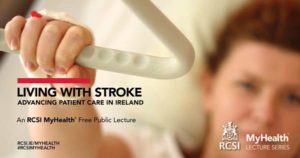Revolutionary clot retrieval procedure now being performed on patients at Beaumont Hospital dramatically improves patient outcomes
People who suffer a stroke can face a number of challenges in how it will impact their everyday lives. However, the quicker patients receive immediate treatment for stroke, in terms of early identification and medical procedures, the less damage it can do the patient in the long term. Additionally, there are a variety of rehabilitation options and community services available to stroke patients and their families in the aftermath that can improve the quality of life for stroke patients.

These will be the focus of a free public lecture taking place as part of the RCSI MyHealth Lecture Series in the Royal College of Surgeons in Ireland (RCSI) this evening, Wednesday, 30 November 2016. The lecture, entitled ‘Living with Stroke – Advancing Patient Care in Ireland’, will be held from 6.30-8.30pm at RCSI, 123 St Stephen’s Green, Dublin 2.
The lecture will give information to members of the public on a recently opened thrombectomy (clot retrieval) services centre at Beaumont Hospital, Dublin. A thrombectomy is a novel clot retrieval procedure used to treat stroke patients which has been found to dramatically improve patient outcomes and reduce disability and deaths from stroke. Research from RCSI and Beaumont Hospital found that a thrombectomy reduces overall stroke patient mortality rate by 50%, and is therefore leading the way in revolutionising how stroke is being treated in Ireland.
A thrombectomy is performed by inserting a thin tube into the artery in the groin, through the body, and into the blood vessels in the brain to remove the clot. This is done under image-guided care using an X-ray. The clot is then removed by a retrievable stent and pulled out, restoring blood flow to the brain. When compared with the process of thrombolysis, the current standard treatment which involves administering ‘clot busting’ medication to dissolve the blood clot, thrombectomy was found to reduce overall patient mortality by 50%. The study also found that this procedure increased positive outcomes for patients from 30% to 55% as compared with current standard treatment.
Speaking ahead of the lecture, event chair, Professor David Williams, Associate Professor in Geriatric and Stroke Medicine, RCSI and Consultant Stroke Physician at Beaumont Hospital said, “Stroke is a major health issue in Ireland, and although deaths from stroke are down by a quarter*, one in every five people in Ireland will suffer a stroke in their lifetime**. A ground-breaking international clinical trial, which was led in Ireland by RCSI and Beaumont Hospital, found a marked reduction in disability and death among patients who receive thrombectomies for acute ischemic stroke****. This led to the establishment of Beaumont Hospital’s thrombectomy services centre which is leading the way in improving care for stroke patients throughout the country. The aim of this RCSI MyHealth lecture is to give attendees some useful information on the current and future landscape of stroke treatment in Ireland, while giving an insight into some of the research taking place which is looking at advancing healthcare for all stroke patients all over the country. We want to get the message across that getting quick and early access to treatment is vital for all types of stroke”.
The event will consist of four speakers and will be chaired by Professor Williams, who will speak about stroke in Ireland and discuss stroke services at Beaumont Hospital. Professor Anne Hickey, Associate Professor in Psychology at the Department of Psychology, RCSI, will then speak about the ways in which stroke affects patients in terms of their mood and cognition, as well as detailing a study which she is leading, called StrokeCog, which involves examining the consequences of stroke-related cognitive impairment and developing an intervention for rehabilitation of cognitive problems after stroke.
Professor Frances Horgan, Associate Professor in Physiotherapy, RCSI will then talk about life after stroke for patients in Ireland. Outlining the various types of rehabilitation many patients will go through, Professor Horgan will give some practical advice for those who have, or know someone who is living with stroke. She will also discuss some research she has conducted with the Irish Heart Foundation (IHF) that investigates the factors affecting patients who wish to return to work after their stroke.
Finally, Helena O’Donnell of IHF will talk about patient advocacy and the F.A.S.T stroke awareness campaign, as well as two stroke audits the IHF have worked on recently which aim to improve access to stroke services for patients and will provide information on IHF’s stroke support groups which are growing all around Ireland.
This event is part of the RCSI MyHealth public lecture series which is free of charge; however registration is essential in order to guarantee a place. Register at www.rcsi.ie/myhealth. For those who are unable to attend on the night, the lecture will also be live streamed at www.rcsi.ie and you can join the conversation online, on the night, on Twitter at #RCSIMyHealth.